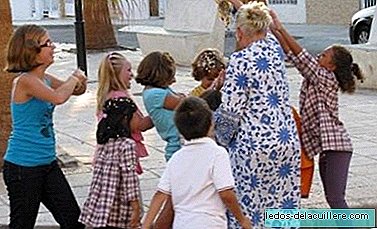On October 15, 2012 he appeared before a commission of the Consell Valencià, on school failure, Professor Mª Angeles Llorente Cortés. She is a woman who has been teaching for 34 years in public centers, and now teaches Mathematics and Nature Sciences at the 'Hoya de Buñol' Secondary Institute (Buñol / Valencia).
The video that I present includes his intervention, as well as the questions and contributions of the different political groups. Therefore it is long, but it is worth hearing as re contextualizes school failure, their opinion on assessments, as well as their ideas about the actors that must intervene to help students and the need for a change in the educational curriculum. Mª Angeles begins forceful and convincing, as she says it is not often that experts in education are invited to the commissions that have to do with this issue, being as they are the most appropriate to speak and contribute their vision. Later, it once again affects the role of teachers, when it manifests the need for an educational change, in which teachers had direct participation.
Reflecting on school failure makes us all think since in truth we all attribute it (to a greater or lesser extent) to students, and this 'It is a tremendous injustice that results in the actions that are implemented not with correct' .
What sustains school failure in our system?
Therefore, before talking about performance, we should first define what we mean. This is justified in three fundamental questions:
- Today in the public centers of Infant, Primary and Secondary, there is a great diversity, this is the reality. We could associate failure with abused or poor children, with students who come from other cultures, but also with those who are more sensitive. Those who leave, and those with special needs or families who cannot help them fail.
All who fail do so, based on what criteria? Who are we leaving without a future?
Although we could also 'humanize the education system. I really like how he also rejects the word opposite to failure: 'I don't like the word success either, the question is how they train to be better people, that's the question. Let's not talk about failure, but about equal opportunities'.
I know that there are people who are not supporters of equal opportunities, who consider it more logical to support bright, motivated or more capable students. And although I do not take away the reason, on many occasions These statements are made from the certainty of being more socially benefited.
- Our evaluation system: assessing knowledge through exams should never be used to classify, select or segregate. A note does not measure what a person knows, and less at an early age.
Performance is confused with qualifications, the part with the whole. An exercise of reductionism and arbitrariness is done, and many times they put obstacles so that children have a taste for knowledge
It would be said that students participate in an obstacle course to pass, and this is a terrible perversion that divides them. Evaluation of processes that serve their formation and not the interests of the market should be done.
In Spanish society there have been no serious and reliable diagnoses about the real problems of education
- Do we really prepare for equality ?, is a sharp question in the speech of Mari Angeles, very conclusive when he says that public education bears all the difficulties without enjoying the necessary budgets.
'How does a society that prepares for equality maintain an education through three networks?' , referring to private, concerted and public education.
A democratic society that boasts of such should offer education for the entire population, this is the ideal of the enlightened school: learning from each other to live in peace and form. Being the public school the backbone, the system would be more compensating and the failure would decrease.
Commitments and solutions
Our protagonist today appeals to the commitment of teachers, families and students to overcome school failure, but also tells us that the administration has a great responsibility.
Family participation should be done through the tutoring system, but also by offering them the necessary information. As for the students, in reality (and although many forget it) they are the center of education, and they would benefit from the decrease in ratios, coexistence plans, active methodologies, etc..
Collegiate management teams with a rotation system are more effective, and stable teaching teams would improve the situation in the centers. Specialization should be allowed but only with the aim of improving coordination.
Most schools should change their organization, and on the other hand a renewal of the educational curriculum is necessary, but not from the political structures that modify the educational plans at will.
From the movements of pedagogical renewal it has been claimed for a long time to work for projects, which do not have so many compartmentalized areas, since the world is not fragmented. Currently, the programs are offered time for reflection, the result of loaded curricula that are unrelated to real life that are neither useful nor practical.
Much more progress would have been made if competency teaching had been fully developed
Mª Angeles speaks of the book as an anachronism and commitment to ICT, exits, documentary research, etc.
This teacher works in a secondary school that has reduced school failure from 40 to 10%, so I think that Your ability to speak professionally about this topic is indisputable. I leave you with the video, if you want to see it, so each of you can form your own opinion.












